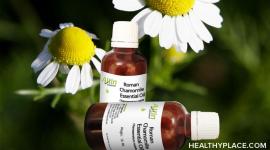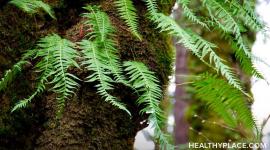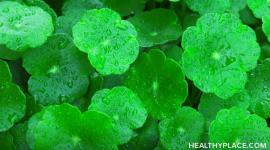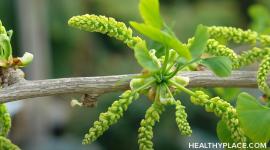St. John's Wort
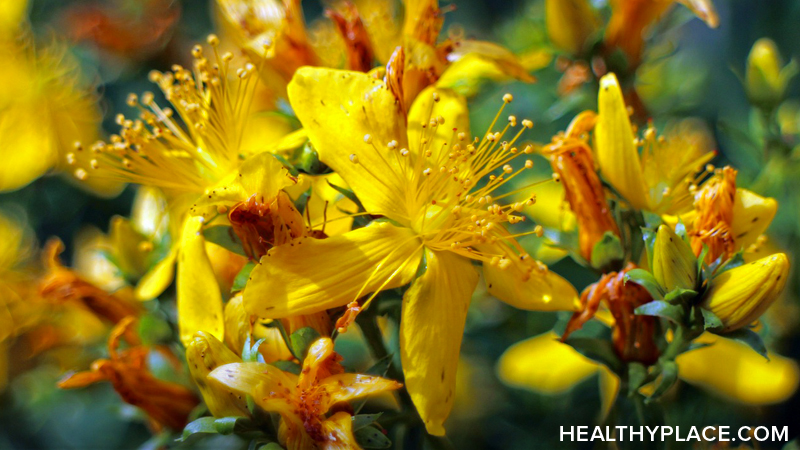
St. John's Wort is an alternative mental health herbal treatment for mild to moderate depression. Learn about the usage, dosage, side-effects of St. John's Wort.
Botanical Name:Piper methysticum
Common Names:Awa, Kava
- Overview
- Plant Description
- What's It Made Of?
- Available Forms
- How to Take It
- Precautions
- Possible Interactions
- References
Overview
St. John's wort (Hypericum perforatum), once thought to rid the body of evil spirits, has a history of medicinal use dating back to ancient Greece, where it was used to treat a range of illnesses, including various 'nervous conditions.' St. John's wort also has antibacterial and antiviral properties and, because of its anti-inflammatory properties, has been used to help heal wounds and burns.
In recent years, there has been renewed interest in St. John's wort as a treatment for depression and there has been a great deal of scientific research on this topic. St. John's wort is one of the most commonly purchased herbal products in the United States. Because St. John's wort interacts with a wide variety of medications, it is important to take it only under the guidance of a healthcare provider who is knowledgeable about herbal medicines.
Alternative Herbal Treatment for Depression (Herbal Antidepressant)
In numerous studies, St. John's wort has been effective in reducing depressive symptoms in those with mild to moderate but not severe (called major) depression. When compared with tricyclic anti-depressants (medication frequently prescribed for this condition) such as imipramine, amitriptyline, doxepin, desipramine, and nortriptyline, St. John's wort is equally effective, and has fewer side effects. This also appears to be true for another well known class of antidepressants called selective serotonin reuptake inhibitors (SSRIs) including fluoxetine and sertraline.
Other
St. John's wort has also shown promise in treating the following conditions, a few of which are related to depression.
- Alcoholism: In animal studies, St. John's wort substantially reduced the craving for and intake of alcohol. It is hypothesized that alcohol abuse may be a form of self-medication and that, by relieving depressive symptoms, St. John's wort may reduce the perceived need for alcohol.
- Bacterial infections: In laboratory studies, St. John's wort has demonstrated the ability to fight certain infections, including some bacteria that are resistant to the effects of antibiotics. More research is needed in this area to understand if these test tube findings will prove useful for people.
- HIV infection and AIDS: While laboratory research suggests that St. John's wort may kill or inhibit the growth of human immunodeficiency virus (HIV; the virus that causes AIDS), St. John's wort has serious interactions with medications used to treat people with the virus. In the case of the protease inhibitor indinavir, for example, concurrent use of St. John's wort may cause the medication to lose its effectiveness. In addition, participants in a study of St. John's wort for people with HIV dropped out of the study prematurely because of intolerable side effects from the herb.
- Premenstrual syndrome (PMS): An early study suggests that St. John's wort may be useful in relieving both physical and emotional symptoms of PMS including cramps, irritability, food cravings, and breast tenderness.
- Seasonal affective disorder (SAD): Used alone, St. John's wort has improved mood in those suffering from SAD (a form of depression that occurs during the winter months because of lack of sunlight). This condition is often treated with photo (light) therapy. Effects may prove to be even greater when the herb is used in combination with light therapy.
- Viral encephalitis: Herbal specialists may recommend use of a tincture containing a combination of ginkgo, St. John's wort, and rosemary to relieve symptoms associated with recovery from brain inflammation (viral encephalitis) such as cognitive impairment, visual and speech disturbances, and difficulty performing routine functions.
- Wounds, minor burns, hemorrhoids: Topical St. John's wort is, at times, recommended by herbal specialists to reduce pain and inflammation and to promote healing by applying the agent directly to the skin. Preliminary laboratory tests are suggesting that this traditional use may have scientific merit.
- Ear painfrom an ear infection: In a study of over 100 children between ages 6 and 18 with ear pain from an ear infection (called otitis media), a combination herbal ear drop, including St. John's wort, garlic, calendula, and mullein flower, alleviated pain as much as a standard pain killing ear drop.
St. John's wort is a shrubby plant with clusters of yellow flowers that have oval, elongate petals. The plant gets its name because it is often in full bloom around June 24, the day traditionally celebrated as the birthday of John the Baptist. Both the flowers and leaves are used for medicinal purposes.
What's It Made Of?
The best-studied active components are hypericin and pseudohypericin, found in both the leaves and flowers. There has been recent research to suggest, though, that these best-studied components may not be the most active in the plant, which also contains essential oils and flavonoids.
Available Forms
St. John's wort can be obtained in many forms: capsules, tablets, tinctures, teas, and oil-based skin lotions. Chopped or powdered forms of the dried herb are also available. St. John's wort products should be standardized to contain 0.3% hypericin.
How to Take It
The bulk of scientific research on St. John's wort has been conducted in adults. However, one large study (over 100 children under age 12) found St. John's wort to be a safe and effective way of treating mild to moderate symptoms of depression in children. Dosage should be directed by a qualified practitioner and will likely be adjusted according to the weight of the child. Children being treated with St. John's wort should be carefully monitored for side effects such as allergic reactions or digestive upset.
Adult
- Dry herb (in capsules or tablets): The usual dose for mild depression and mood disorders is 300 to 500 mg (standardized to 0.3% hypericin extract), three times per day, with meals.
- Liquid extract (1:1): 40 to 60 drops, two times per day.
- Tea: Pour one cup of boiling water over 1 to 2 tsp of dried St. John's wort and steep for 10 minutes. Drink up to 2 cups per day for four to six weeks.
- Oil or cream: To treat inflammation, as in wounds, burns or hemorrhoids, an oil-based preparation of St. John's wort can be applied topically.
Internal dosages generally require at least eight weeks to get the full therapeutic effect.
Precautions
The use of herbs is a time-honored approach to strengthening the body and treating disease. Herbs, however, contain active substances that can trigger side effects and interact with other herbs, supplements, or medications. For these reasons, herbs should be taken with care, under the supervision of a practitioner knowledgeable in the field of botanical medicine.
Many people take St. John's wort for depression. It is important to bear in mind that depression can be a serious condition and may be accompanied by thoughts of suicide or homicide, both of which warrant immediate medical attention. Evaluation by a healthcare professional should always be sought before using St. John's wort.
Potential side effects from St. John's wort are generally mild. They include stomach upset, hives or other skin rash, fatigue, restlessness, headache, dry mouth, and feelings of dizziness or mental confusion. Although not common, St. John's wort can also make the skin overly sensitive to sunlight (called photodermatitis). Those with light skin who are taking St. John's wort in large doses or over a long period of time should be particularly careful about sun exposure. The use of sunscreen with a skin protection factor (SPF) of at least 15, and the avoidance of sunlamps, tanning booths, or tanning beds is recommended while taking St. John's wort.
Because of the potential for serious interaction with medications used during surgery, patients should discontinue the use of St. John's wort at least 5 days prior to surgery and should avoid taking it post surgery. See Possible Interactions for more information about mixing St. John's wort and medications.
St. John's wort should not be taken by women who are pregnant, trying to become pregnant, or breastfeeding.
Possible Interactions
St. John's wort interacts with a range of medications. In most cases, this interactions leads to reduced the effectiveness of the medication in question; in other cases, however, St. John's wort may increase the effects of a medication.
If you are currently being treated with any of the following medications, you should not use St. John's wort without first talking to your healthcare provider:
Antidepressants
St. John's wort may interact with a such as ntidepressant medications that are used to treat depression or other mood disorders, including tricyclics, SSRIs (see earlier discussion), and monoamine oxidase inhibitors (MAOIs)phenelzine. How St. John's wort works is not entirely clear, but is believed to be similar to how SSRIs work. Therefore, using St. John's wort with this class of antidepressants in particular can lead to exacerbation of side effects including headache, dizziness, nausea, agitation, anxiety, lethargy, and lack of coherence.
Digoxin
St. John's wort should not be taken by those on digoxin because the herb may decrease levels of the medication and reduce its effectiveness.
Immunosuppressive medications
St. John's wort should not be taken by those on immunosuppressive medications such as cyclosporine because it may reduce the effectiveness of these medications. In fact, there have been many reports of cyclosporin blood levels dropping in those with a heart or kidney transplant, even leading to rejection of the transplanted organ.
Indinavir and other protease inhibitors
The Food and Drug Administration (FDA) issued a public health advisory in February 2000 concerning the probable interaction between indinavir and St. John's wort that resulted in significantly decreased blood levels of this protease inhibitor, a class of medications used to treat HIV or AIDS. The FDA recommends that St. John's wort not be used with any type of antiretroviral medication used to treat HIV or AIDS.
Loperamide
There has been a report of a possible interaction between St. John's wort and the antidiarrheal medication, loperamide leading to delirium in an otherwise healthy woman.
Oral contraceptives
There have been reports of breakthough bleeding in women on birth control pills who were also taking St. John's wort.
Reserpine
Based on animal studies, St. John's wort may interfere with the intended action of this medication used to treat high blood pressure.
Theophylline
St. John's wort can reduce levels of this medication in the blood leading. Theophylline is used to open the airways in those suffering from asthma, emphysema, or chronic bronchitis.
Warfarin
St. John's wort interferes with the anticoagulant medication, warfarin, by reducing blood levels as well as the effectiveness. This leads to the need to for adjustments in doses of this medication.
back to: Herbal Treatments Homepage
Supporting Research
Ang-Lee MK, Moss J, Yuan CS. Herbal medicines and perioperative care. JAMA. 2001;286(2):208-216.
Barrett B, Kiefer D, Rabago D. Assessing the risks and benefits of herbal medicine: an overview of scientific evidence. Altern Ther Health Med. 1999;5(4):40-49.
Beaubrun G, Gray GE. A review of herbal medicines for psychiatric disorders. Psychiatr Serv. 2000;51(9):1130-1134.
Biffignandi PM, Bilia AR. The growing knowledge of St. John's wort (Hypericum perforatum L) drug interactions and their clinical significance. Curr Ther Res. 2000;61(70):389-394.
Blumenthal M, Goldberg A, Brinckmann J. Herbal Medicine: Expanded Commission E Monographs. Newton, MA: Integrative Medicine Communications; 2000:359-366.
Breidenbach T, Hoffmann MW, Becker T, Schlitt H, Klempnauer J. Drug interaction with St. John's wort with cyclosporin. Lancet. 1000;355:576-577.
Breidenbach T, Kliem V, Burg M, Radermacher J, Hoffman MW, Klempnauer J. Profound drop of cyclosporin A whole blood trough levels caused by St. John's wort (Hypericum perforatum) [letter]. Transplantation. 2000;69(10):2229-2230.
Brenner R, Azbel V, Madhusoodanan S, Pawlowska M. Comparison of an extract of hypericum (LI 160) and sertraline in the treatment of depression: a double-blind, randomized pilot study. Clin Ther. 2000;22(4):411-419.
Brinker F. Herb Contraindications and Drug Interactions. 2nd ed. Sandy, Ore: Eclectic Medical; 1998:123-125.
Carai MAM, Agabio R, Bombardelli E, et al. Potential use of medicinal plants in the treatment of alcoholism. Fitoterapia. 2000;71:538-542.
De Smet P, Touw D. Safety of St. John's wort (Hypericum perforatum) [letter]. Lancet. 2000;355:575-576.
Ernst E, Rand JI, Barnes J, Stevinson C. Adverse effects profile of the herbal antidepressnat St. John's wort (Hypericum perforatum L.) Eur J Clin Pharmacol. 1998;54:589-594.
Ernst E, Rand JI, Stevinson C. Complementary therapies for depression. Arch Gen Psychiatry. 1998;55:1026-1032.
Ernst E. Herbal medications for common ailments in the elderly. Drugs & Aging. 1999;6:423-428.
Ernst E. Second thoughts about safety of St John's wort. Lancet. 1999;354:2014-2015.
Food and Drug Administration. Risk of Drug Interactions with St John's Wort and Indinavir and Other Drugs. Rockville, Md: National Press Office; February 10, 2000. Public Health Advisory.
Foster S, Tyler VE. The Honest Herbal: A Sensible Guide to the Use of Herbs and Related Remedies. New York, NY: The Haworth Herbal Press;1999:331-333.
Fugh-Berman A, Cott JM. Dietary supplements and natural products as psychotherapeutic agents. Psychosom Med. 1999;61:712-728.
Gaster B, Holroyd J. St. John's wort for depression. Arch Intern Med. 2000;160:152-156.
Gordon JB. SSRIs and St. John's Wort: possible toxicity? [letter] Am Fam Physician. 1998;57(5):950,953.
Grush LR, Nierenberg A, Keefe B, Cohen LS. St. John's wort during pregnancy [letter]. JAMA. 1998;280(18):1566.
Hubner W-D, Kirste T. Experience with St John's wort (Hypericum perforatum) in children under 12 years with symptoms of depression and psychovegetative disturbances. Phytother Res. 2001;15:367-370.
Hypericum Depression Trial Study Group. Effect of Hypericum perforatum (St John's wort) in major depressive disorder: a randomized controlled trial. JAMA. 2002;287:1807-1814.
Johne A, Brockmoller J, Bauer S, et al. Pharmacokinetic interaction of digoxin with an herbal extract from St. John's wort (Hypericum perforatum). Clin Pharmacol Ther. 1999;66:338-345.
Khawaja IS, Marotta RF, Lippmann S. Herbal medicines as a factor in delirium. Psychiatr Serv. 1999;50:969-970.
Kim HL, Streltzer J, Goebert D. St. John's wort for depression: a meta-analysis of well-defined clinical trials. J Nerv Ment Dis. 1999;187:532-539.
Lantz MS, Buchalter E, Giambanco V. St. John's wort and antidepressant drug interactions in the elderly. J Geriatr Psychiatry Neurol. 1999;12(1):7-10.
Linde K, Mulrow CD. St. John's wort for depression (Cochrane Review). In: The Cochrane Library, Issue 4, 2000. Oxford: Update Software.
Linde K, Ramirez G, Mulrow CD, Pauls A. Weidenhammer W, Melchart D. St. John's wort for depression: an overview and meta-analysis of randomised clinical trials. BMJ. 1996;313:253à ¢Ã¢â€š ¬Ã¢â‚¬Å“257.
Martinez B, Kasper S, Ruhrmann S, Moller HJ. Hypericum in the treatment of seasonal affective disorders. J Geriatr Psychiatry Neurol. 1994;7(Suppl 1):S29à ¢Ã¢â€š ¬Ã¢â‚¬Å“33.
Miller LG. Herbal medicinals: selected clinical considerations focusing on known or potential drug-herb interactions. Arch Intern Med. 1998;158(20):2200à ¢Ã¢â€š ¬Ã¢â‚¬Å“2211.
Morelli V, Zoorob RJ. Alternative therapies: Part 1. Depression, diabetes, obesity. Am Fam Phys. 2000;62(5):1051-1060.
Nebel A, Schneider BJ, Baker RK, et al. Potential metabolic interaction between St. John's wort and theophylline. Ann Pharmacother. 1999;33:502.
Obach RS. Inhibition of human cytochrome P450 enzymes by consituents of St. John's wort, an herbal preparation in the treatment of depression. J Pharmacol Exp Ther. 2000;294(1):88-95.
O'Hara M, Kiefer D, Farrell K, Kemper K. A review of 12 commonly used medicinal herbs. Arch Fam Med. 1998;7(6):523-536.
Ondrizek RR, Chan PJ, Patton WC, King A. An alternative medicine study of herbal effects on the penetration of zona-free hamster oocytes and the integrity of sperm deoxyribonucleic acid. Fertil Steril. 1999;71(3):517-522.
Phillipp M, Kohnen R, Hiller KO. Hypericum extract versus impramine or placebo in patients with moderate depression: randomised multicentre study of treatment for eight weeks. BMJ. 1999:319(7224):1534-1538.
Piscitelli S, Burstein AH, Chaitt D, et al. Indinavir concentrations and St. John's wort [letter]. Lancet. 2000;355:547-548.
Pizzorno JE, Murray MT. Textbook of Natural Medicine. New York: Churchill Livingstone; 1999:268-269, 797-804.
Rezvani AH, Overstreet DH, Yang Y, Calrk E. Attenuation of alcohol intake by extract of Hypericum perforatum (St. John's wort) in two different strains of alcohol-preferring rats. Alcohol Alcohol. 1999;34(5):699-705.
Robbers JE, Tyler V. Herbs of Choice: The Therapeutic Use of Phytomedicinals. New York, NY: The Haworth Herbal Press; 1999:166-170.
Rotblatt M, Ziment I. Evidence-Based Herbal Medicine. Philadelphia, Penn:Hanley & Belfus, Inc. 2002:315-321.
Ruschitzka F, Meier PJ, Turina M, et al. Acute heart transplant rejection due to Saint John's wort [letter]. Lancet. 2000,355.
Sarrell EM, Mandelberg A, Cohen HA. Efficacy of naturopathic extracts in the management of ear pain associated with acute otitis media. Arch Pediatr Adolesc Med. 2001;155:796-799.
Schempp CM, Pelz K, Wittmer A, Schopf E, Simon JC. Antibacterial activity of hyperforin from St. John's wort, against multireistant Staphylococcus aureus and gram-positive bacteria. Lancet. [Research Letters]1999;353:2129.
Schempp CM, Winghofer B, Ludtke R, Simon-Haarhaus B, Shopp E, Simon JC. Topical application of St John's wort (Hypericum perforatum L) and of its metabolite hyperforin inhibits the allostimulatory capacity of epidermal cells. Br J Derm. 2000;142:979-984.
Schrader E. Equivalence of St John's wort extract (Ze 117) and fluoxetine: a randomized, controlled study in mild-moderate depression. Int Clin Psychopharmacol. 2000;15(2):61-68.
Shelton RC, Keller MB, Gelenberg A, et al. Effectiveness of St. John's wort in major depression: a randomized controlled trial. JAMA. 2001;285(15):1978-1986.
Stevinson C, Ernst E. A pilot study of Hypericum perforatum for the treatment of premenstrual syndrome. British Journal of Obstetrics and Gynaecology. 2000;107:870-876.
Volz HP, Laux P. Potential treatment for subthreshold and mild depression: a comparison of St. John's wort extracts and fluoxetine. Comp Psych. 2000;41(2 Suppl 1):133-137.
White L, Mavor S. Kids, Herbs, Health. Loveland, Colo: Interweave Press; 1998:22, 40.
Woelk H, for the Remotiv/Imipramine Study Group. Comparison of St. John's wort and imipramine for treating depression: randomized controlled trial. BMJ. 2000;321:536-539.
Wong AH,Smith M, Boon HS. Herbal remedies in psychiatric practice. Arch Gen Psych. 1998;55(11):1033-1044.
Yue Q, Bergquist C, Gerden B. Safety of St. John's wort (Hypericum perforatum) [letter]. Lancet. 2000;355:576-577.
The publisher does not accept any responsibility for the accuracy of the information or the consequences arising from the application, use, or misuse of any of the information contained herein, including any injury and/or damage to any person or property as a matter of product liability, negligence, or otherwise. No warranty, expressed or implied, is made in regard to the contents of this material. No claims or endorsements are made for any drugs or compounds currently marketed or in investigative use. This material is not intended as a guide to self-medication. The reader is advised to discuss the information provided here with a doctor, pharmacist, nurse, or other authorized healthcare practitioner and to check product information (including package inserts) regarding dosage, precautions, warnings, interactions, and contraindications before administering any drug, herb, or supplement discussed herein.
back to: Herbal Treatments Homepage
APA Reference
Staff, H.
(2008, October 21). St. John's Wort, HealthyPlace. Retrieved
on 2026, January 23 from https://www.healthyplace.com/alternative-mental-health/herbal-treatments/st-johns-wort
